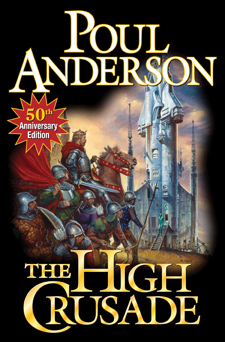This year marks the 50th anniversary of the publication of Poul Anderson’s The High Crusade in the pages of Astounding magazine (later to be known as Analog that very year). In celebration, Baen Books is releasing an anniversary paperback edition on Tuesday, September 7th, with appreciations from some of science fiction’s greatest names.
Tor.com will be posting these appreciations throughout Monday and Tuesday of this week, courtesy of Baen Books. These appreciations originally appeared at WebScription, where you can also sample the first few chapters of The High Crusade.
My God, has it really been fifty years? I’m looking right now at the July 1960 issue of the magazine we all had known and loved as Astounding Science Fiction, which just a few months before had renamed itself, bewilderingly, Analog Science Fact & Fiction, and there is a sly-looking guy on the cover wearing medieval armor, and a bunch of axe-wielding Viking types stand behind him, and, vaguely visible in the background, are the silvery snouts of what surely had to be spaceships, standing upright, balancing on their vanes as spaceships were meant to do. And in bold white-on-black letters at the bottom are the words, “THE HIGH CRUSADE By Poul Anderson.”
And the July 1960 issue—no matter how many times I do the math, it comes out to be fifty years old. I have trouble believing that. It seems like just yesterday, or, let us say, the day before yesterday, that I picked up that issue in John W. Campbell’s editorial office.
“You’ll love it,” John said, as I grinned at that cover. “It’s Poul at his best.”
We were all very young then. I was twenty-five and had already been a precocious contributor to John Campbell’s Astounding for five years. Poul, another early starter as a writer, was thirty-four and already quite famous. And John Campbell himself, that veritable Zeus of science-fiction editors, the dominant figure in the field since the time when I was cutting my first baby teeth, was all of fifty years old.
There we have that phrase again. Fifty years old. On that spring day in 1960 when I stood in that office with the newly minted July issue of Analog in my hands, John Campbell himself, the monarch of science fiction, was fifty years old. William Howard Taft had been president when John was born in 1910. Edward VII was the king of England. The Austro-Hungarian Empire, under whiskery old Kaiser Franz Joseph, was still a going concern. Nicholas II was Czar of All the Russias. The airplane had been invented just seven years before and was not much more than a novelty for daredevils. The automobile and the photograph and the motion picture were hardly much older. Radio, television, computers, the Internet? Don’t be silly. They were still just science fiction then, except the term “science fiction” itself didn’t yet exist. And now that issue of Astounding that gave Poul Anderson’s The High Crusade to a world of eager readers stands exactly midway in time between the practically prehistoric world into which John W. Campbell had been born and the all too modern one I inhabit this spring morning in 2010.
The interesting thing is that Poul’s novel seems just as fresh and brisk and lively today as it did to those of us, grizzled gray-beards now, who pounced on it when it made its first appearance in Analog.
Poul Anderson, though he still had a long and glorious career ahead of him, was already one of the big figures of science fiction in 1960. His very first published story, the 1947 atomic-doom tale “Tomorrow’s Children,” had gone straight into the pioneering anthology A Treasury of Science Fiction, where I encountered it a couple of years later. All through the Fifties had come a flood of superb short stories—“Sam Hall” in 1953, the Time Patrol tales a few years later, the unforgettable novella “Call Me Joe” in 1957, and dozens of others. At the same time he was producing a string of brilliant novels at a relentless pace, among them Three Hearts and Three Lions of 1953 (a precursor in theme of The High Crusade), the dazzling Brain Wave of 1954, The Long Way Home in 1955, and, in 1958, a trio of novels—The Man Who Counts, We Have Fed Our Seas, and A Bicycle Built for Brew with which Poul performed the astonishing stunt of having three novels serialized in succession in the field’s leading magazine, Campbell’s Astounding. And in 1959 he received what was then the field’s highest accolade, in those remote days before Nebula and Grand Master awards, when he was chosen Guest of Honor at that year’s World Science Fiction Convention, one of the youngest writers ever to be so designated.
So the manifold delights and pleasures of that rollicking novel The High Crusade came as no surprise, back there in 1960, and those of us who were on the scene then raced through the three installments of the magazine serialization as fast as we could pry them out of John Campbell. Then came the first book publication, a Doubleday hardcover a few months later, and many another edition in the years that followed. Poul is gone, now, more’s the pity—he was a neighbor of mine out here in California, and a friend for more than forty years—but his books live on, and I’m happy to see his lovely High Crusade coming into a new incarnation now.
Robert Silverberg is an American author and editor of science fiction. His incredibly prolific bibliography includes dozens of novels, non-fiction books, short stories, and collections. He is the winner of multiple Hugo and Nebula awards, and has the distinction of winning major awards in each of six decades (from the 1950s to the 2000s).










